8 High-Tryptophan Foods Besides Turkey (Plus, Do They Really Make You Tired?)
Hint: It's probably more than the bird making you sleepy.
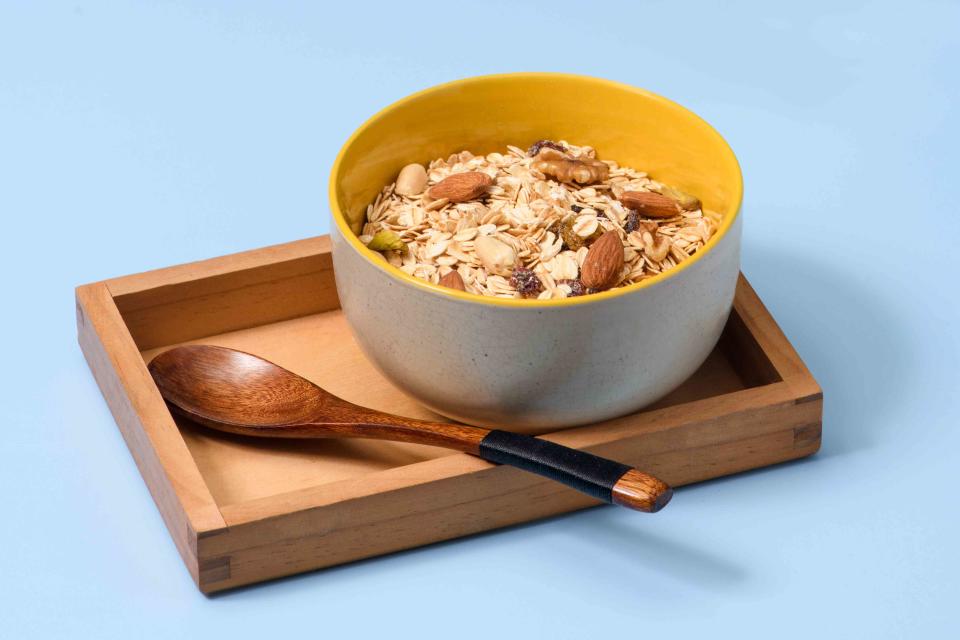
Jordan Lye/Getty Images
With the holidays fast approaching, many families are in preparation mode, meal planning and placing orders for their celebratory turkeys. As turkey sales skyrocket, so does interest in one of turkey’s most buzz-worthy nutrients, the alleged reason behind your post-Thanksgiving-dinner sleepiness: tryptophan. Let’s find out more about this protein component that’s often the scapegoat for why your uncle famously needs a nap after every Turkey Day meal.
What is tryptophan?
Tryptophan is an essential amino acid that’s a vital building block for protein in the body. There are 20 known amino acids, nine of which cannot be created within the body and must be consumed in the diet, thus considered “essential.” Tryptophan fits under this umbrella.
Research has found that tryptophan also plays an important role in the gut microbiome-brain connection. This is because it’s a precursor to serotonin, a neurotransmitter that is key for main functions, including healthy sleep, hunger, pain recognition, and emotional processing. It’s also involved in the synthesis of melatonin, a hormone that helps with circadian rhythm regulation and sleep. These functions combine to potentially leave you feeling mighty sleepy after a tryptophan-heavy meal, as tryptophan is linked to increased tiredness and decreased time needed to fall asleep.
Tryptophan can also be used by the liver to create niacin, or vitamin B3, in the body. Niacin is pivotal in energy metabolism and DNA production.
Does tryptophan actually make you sleepy?
Tryptophan is certainly linked to sleep—some research has found that a tryptophan-rich diet, which promotes serotonin and melatonin activity, may help contribute to better sleep. However, consuming a turkey dinner (or other tryptophan-laden meal) doesn't immediately put you under a magic sleep spell as we've come to believe. This is because it's also been found that the absorption of tryptophan is reduced by the presence of additional amino acids (also present in turkey). Oftentimes, foods contain multiple amino acids, lessening tryptophan's effects.
So after, say, a large, filling holiday meal with many different foods, it’s more likely that a surge of blood flow to the gut, and away from the brain, is what causes feelings of tiredness—rather than the tryptophan found in turkey.
:10 Foods to Eat for Better Sleep (That Aren't Chamomile Tea)
Tryptophan Foods
The recommended intake for tryptophan is between 250 milligrams (mg) and 425 mg per day. Below are some of the highest tryptophan food sources that can help you get there, whether or not you're a meat-eater (and that you’re likely already eating year-round, not just on Thanksgiving!).
Poultry
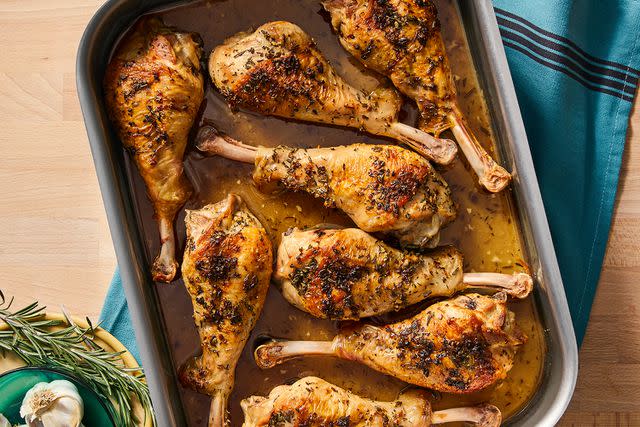
Christopher Testani
:Rosemary Roasted Turkey Legs Recipe
We can’t have a list of tryptophan-rich foods without mentioning poultry, particularly turkey and chicken, which are high on the list. Per pound, turkey contains somewhere between 303 mg and 410 mg of tryptophan, and chicken contains a bit less, somewhere between 238 mg and 256 mg. Fun fact: White or light meat, like the breast, will actually contain more tryptophan than dark meat (thighs, legs, and wings).
Oats
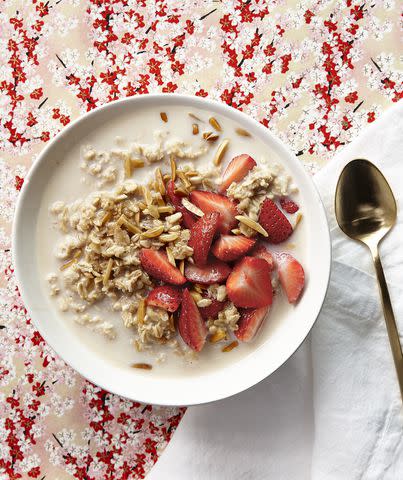
:Strawberry and Almond Overnight Oats Recipe
While many people associate tryptophan with animal-based sources, there are quite a few plant-based sources of this amino acid, including oats. One cup of cooked oatmeal can offer anywhere between 97 mg and 147 mg of tryptophan. Oats are also an incredible source of soluble fiber, helping to regulate digestion and cholesterol levels.
Dairy
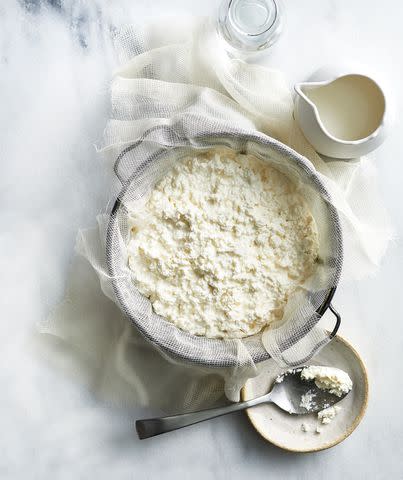
Whether it’s milk or cheese, dairy can provide a hefty dose of tryptophan, depending on the source. While cheese contains about 91 mg of tryptophan per ounce, whole milk boasts 183 mg per cup, making it one of the best sources available to us. Comparatively, 2 percent or reduced-fat milk contains 138 mg per cup.
Nuts and Seeds
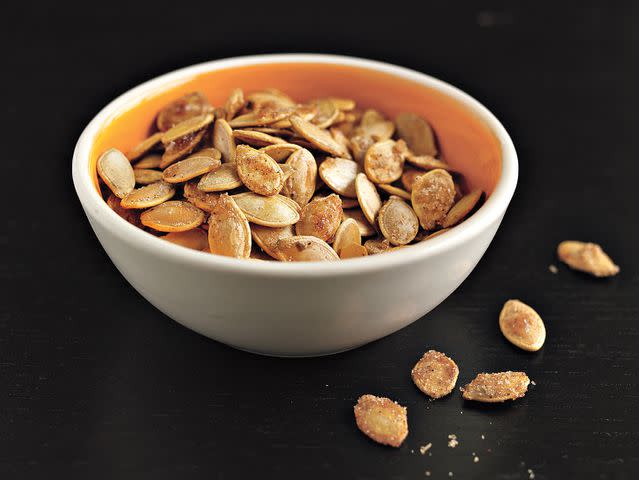
:Sweet and Salty Pumpkin Seeds Recipe
Certain nuts and seeds are great vegan sources of tryptophan. One ounce of pumpkin seeds offers an impressive 162 mg of tryptophan, while two tablespoons of peanut butter provides 74 mg. Pumpkin seeds are also rich in alpha-linoleic acid, an omega-3 fatty acid that helps reduce bodily inflammation.
:8 Pumpkin Seed Recipes—Plus How to Roast Them to Perfection
Pork
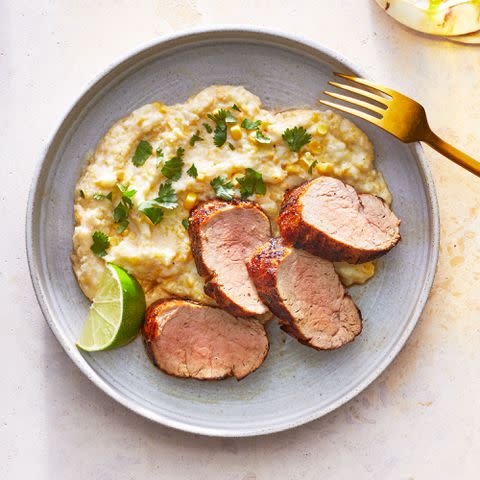
:Pork Tenderloin With Fresh Polenta Recipe
Some pork products provide little in the way of nutrition (sorry, bacon), but pork is actually one of the most concentrated sources of tryptophan that we know of. Three ounces of pork chops contains 314 mg of tryptophan. Pork is also high in selenium, a trace mineral that can be hard to consume enough of. It plays an important role in thyroid and immune system health. When choosing pork products, look for leaner cuts, like a tenderloin or lean chop with little visible fat.
Soy
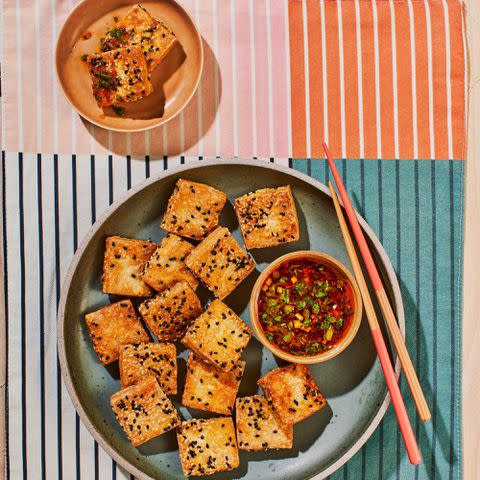
:Sesame-Crusted Tofu With Spicy Dipping Sauce Recipe
Soy products like edamame and tofu contain a surprisingly high amount of tryptophan. One cup of cooked firm tofu offers an impressive 592 mg of tryptophan. Edamame is not far behind with one cup providing 416 mg. Both tofu and edamame are loaded with fiber to help maintain a healthy gut microbiome and overall digestive health. They’re also full of potassium, a key electrolyte that’s crucial in regulating heartbeat and muscle function.
Fish

Beyond being excellent sources of anti-inflammatory omega-3 fatty acids, salmon and tuna also deliver in the tryptophan department. Both canned tuna and fresh salmon contain a staggering 252 mg per 3 ounces. When choosing seafood, keep sustainable practices in mind. Spend the extra time inquiring about how the salmon was caught or do a quick Google search on the brand of canned tuna you’re looking to buy. (Here’s more on how to shop for sustainable seafood—our oceans will thank you!)
Eggs
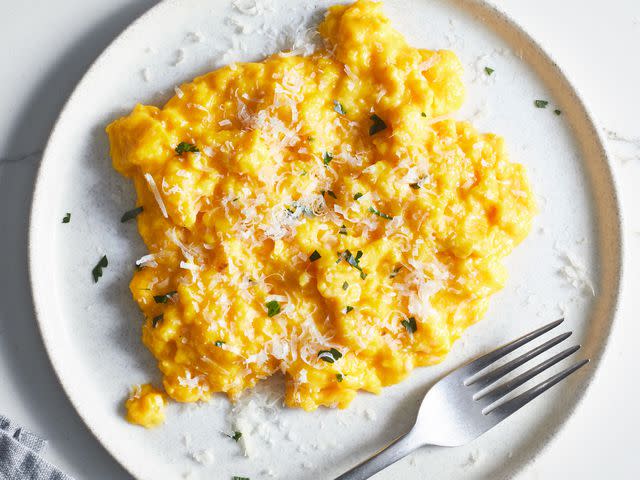
:Parmigiano-Reggiano Scrambled Eggs Recipe
Eggs are not only a great source of protein and vitamin D, but they also contain a noteworthy amount of tryptophan: a single egg provides 77 mg. Plus, eggs are full of the pigment carotenoids, specifically lutein and zeaxanthin, which are powerful antioxidants that have been found to be highly effective in improving eye health.
Whether you’re vegan, vegetarian, dairy-free, or none of the above, there's a tryptophan-rich food for you. Beyond the role it plays in sleep, tryptophan has many additional benefits that shouldn't be overlooked. Eating a variety of foods containing tryptophan at least a few times per week can help strengthen your brain-gut microbiome connection, boost serotonin levels, and support your body in producing niacin, a key B vitamin.
For more Real Simple news, make sure to sign up for our newsletter!
Read the original article on Real Simple.

